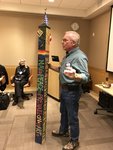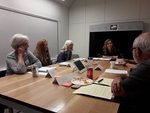

The Rotary Club of Three Creeks is looking to build peace by working to reverse the polarization happening in public discourse.
The relatively new Clark County club, founded October 2016, has been designated a Peacebuilder, part of the overarching Rotarian Action Group for Peace. Peacebuilder clubs have a focus on conflict resolution and mediation, and Rotary of Three Creeks has a particular asset in one founding member’s drive to see real results.
Army veteran Dan Sockle has been spearheading the club’s Peacebuilder efforts, joining forces with other groups set on depolarizing political discourse while coming up with his own ideas to make an impression on youth. He said Rotary’s push for peace started locally after the organization’s 2012 international conference where the theme was “Peace Through Service” — the event was attended by several individuals from the local Rotary district who brought the message home.
Sockle was initially asked to form a Peacebuilder committee when he was part of the downtown Vancouver Rotary club. Following the formation of Rotary of Three Creeks he brought the concept with him.
One of the more visible projects for Peacebuilder clubs were Peace Poles, conspicuous structures bearing the phrase “may peace prevail on Earth” in several different languages. Three Creeks has erected two so far in Clark County — the fixtures were designed as rallying points for discourse, with Sockle likening them to talking sticks found in some Native American cultures.
Though he felt the Peace Pole projects were a step in the right direction, Sockle wanted to do more. One of the avenues he has taken has been working with the Better Angels program, a nationwide effort specifically aimed at depolarizing America.
Sockle said Better Angels came to his attention earlier this year. Their signature event is the Red/Blue workshop, which he explained was a roughly seven-hour series of exercises designed to break down the stereotypes between conservatives and progressives.
Sockle said often participants going into the workshop don’t know what to expect, or expect the worst from the “other side” of the political spectrum. The very first exercise involves those identifying as “red” or “blue” breaking up into their respective groups to discuss the top-five stereotypes that the opposing side had of them.
Sockle said the discussions end up getting to the “kernel of truth” behind the broad generalizations.
“Each side will have hopefully done some soul-searching and realize that there’s these stereotypes, there’s reasons for them, but now’s your chance to kind of clear the air as to how to you really feel what’s more accurate,” Sockle explained.
After a lunch break it’s time for the “fishbowl,” the signature exercise of the Red-Blue workshop. One side comes to the center of the room with the other on their perimeter. The ones in the center discuss what they feel are the strengths and what concerns them the most about their ideology and political party while those on the outside listen.
Sockle said that by the conclusion of the workshop new friendships are established from individuals on opposing sides and participants gain a realization that political ideologies are more nuanced than black-and-white portrayals in media and by the parties.
“It’s a very satisfying conclusion and you kind of see lightbulbs going off, a little enlightenment,” Sockle said. “It’s almost magical in the transformation that occurs.”
Sockle said each of the four Red/Blue workshops he has been a part of have been on the Portland side of the river. He would like to see the events expand to Clark County, especially given the greater amount of right-leaning individuals north of the Columbia.
Sockle said one of the biggest challenges for Better Angels was getting self-professed conservatives to take part.
Another aspect of Peacebuilder outreach for Rotary of Three Creeks was a “Guest Speakers Bureau,” a database of local professionals who have volunteered to speak on a variety of topics at area schools when requested. As of last week more than two dozen speakers were in the database with a variety of topics, ranging from world politics, teen driver safety to sexual assault among many others.
Sockle said making the bureau was spurred on by the death of Dale Bowlin, a local World War II veteran. Bowlin was saved by German soldiers following an artillery shell explosion that led to him losing a leg — the common humanity he saw from ostensible enemies would color the speeches he gave to local youth throughout his postwar life.
Sockle said during Bowlin’s presentations he would pull up his pant leg and tap his prosthetic to send the message home — “it really made an impression on the kids,” Sockle remarked.
Sockle said the speakers bureau fit the Peacebuilders goal by providing role models to area youth. Both the bureau and involvement with groups like Better Angels have characterized Rotary of Three Creeks’ push to foster dialogue and civility in a polarizing political climate.
Spurred on by Sockle’s efforts, Rotary of Three Creeks President Nelson Holmberg took part in one of the Red/Blue workshops, which he said opened his eyes regarding the nature of public discourse.
Holmberg said Rotary of Three Creeks taking on the role of Peacebuilder makes sense because its age demographic is younger than other clubs, and overall the club is more action-oriented — in his admittedly-biased opinion.
“Every Rotary club has that same sentiment, making a difference and taking action,” Holmberg said, though he pointed to his own club completing 24 service projects in its first two years of existence as proof positive they are doing so.
“I think really that’s why people in our club have gotten behind the effort on the Peacebuilders thing,” Holmberg remarked. He noted that Sockle’s experience and training in being a mediator has been an asset in their efforts to focus on that route of service.
“We’re fortunate to have his expertise in our club, and also his passion for this kind of discussion,” Holmberg remarked.